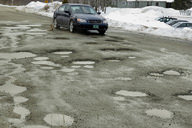13.1风化和侵蚀
章节大纲
-
Why are these rocks different?
::为什么这些岩石不同?The seen on the left is being mined in a quarry. What are the features of the rock? The rock seen on the right is exposed in an outcrop . How do the features of these rocks differ? The rock in the quarry is being exposed to the elements for the first time. It is not weathered. The rock in the outcrop has been weathering for many thousands of years. Can you identify the weathering features?
::左边看到的是在采石场中开采的。 岩石的特征是什么? 右边的岩石在外壳中暴露。 这些岩石的特征有何不同? 采石场的岩石第一次暴露于这些元素中。 岩石没有被风化过。 边缘的岩石已经经受了数千年的天气。 您能辨别一下天气特征吗 ?Weathering
::气象天气Weathering changes solid rock into pieces. These pieces are called sediments . Sediments are described in the chapter Earth's Materials and Crust . Sediments are different sizes of rock particles. Boulders are sediments; so is gravel. At the other end, silt and clay are also sediments. Weathering may also cause the at the Earth’s surface to change form. The new minerals that form are stable at the Earth’s surface. There are two types of weathering, mechanical and chemical. These are discussed in both and .
::气象变固岩石成碎片。 这些碎块被称为沉积物。 沉积物在《地球材料》和《结壳》一章中描述。 沉积物是不同的岩石颗粒大小。 泥沙是沉积物, 碎石也是碎石。 在另一端, 淤泥和泥土也是沉积物。 天气还可能导致地球表面的形态变化。 形成于地球表面的新矿物稳定。 有两种类型的天气、 机械和化学物质。 这些在这两方面都有讨论。Weathering Takes Time
::气象天气变化需要时间No one can watch for millions of years as mountains are built. And no one can watch as those same mountains gradually are worn away. But imagine a new sidewalk or road. The new road is smooth and even. Over hundreds of years, it will completely disappear. What happens to that road over one or two years? What changes would you see ( Figure )? What forces of weathering wear down that road, or rocks or mountains over time?
::没有人能够看着数以百万计的山岳建造,没有人能够看着同样的山岳逐渐破损。但想象一下新的人行道或道路。新的道路是平坦的,甚至平坦的。数百年来,它将完全消失。在一两年里,这条道路会发生什么变化?你会看到什么变化?在这条公路上,或者岩石或山上,风化的力量是什么?One bad winter can cause a road to weather. The potholes in this road will need to be fixed. Erosion
::侵蚀Erosion moves sediments after they have formed. The sediments are transported away from the place where they form. There are several agents of erosion. Flowing water moves and deposits sediments. Water erodes far more material than any other erosional agent. Wind is important as an agent of erosion. This is especially true in arid climates. Ice, in , can erode enormous quantities of sediments. Gravity as a force of erosion pulls material downhill.
::沉积物在形成后会侵蚀沉积物。沉积物从形成沉积物的地方运走。有几种侵蚀因素。水流移动和沉积沉积物。水侵蚀的物质比任何其他侵蚀剂都要多得多。风作为侵蚀的诱因很重要。在干旱气候中尤其如此。冰可以侵蚀大量的沉积物。重力作为侵蚀力将物质引向下坡。Many types of landforms are created by the erosion of sediments. Canyons are one example.
::沉积物侵蚀造成许多类型的土地形态,峡谷就是一个例子。Deposition
::交存Sediments are deposited in an environment of deposition. This can be a sand dune , beach , lake , river bend, or a great number of other locations. Scientists can figure out the environment of deposition of a sedimentary rock by looking at the size of sediments and the sedimentary features in the rock.
::沉积物沉积在沉积环境中,可以是沙丘、海滩、湖泊、河流弯曲或其他许多地点,科学家可以通过观察沉积岩的沉积规模和沉积地特征,了解沉积岩沉积环境。Many types of landforms are created by the deposition of sediments. River deltas are one example.
::沉积物沉积产生了许多类型的陆地形态,河流三角洲就是一个例子。Changing Landscapes
::变化景观Plate tectonics forces work to build huge mountains and other landscapes. Conversely, the forces of weathering gradually wear down those rocks and landscapes. Together with erosion, tall mountains turn into hills and even plains . The Appalachian Mountains along the east coast of North America were once much taller than they are now.
::热电板构造力量致力于建设巨大的山峰和其他景观。 相反,气候变迁的力量逐渐耗尽了这些岩石和景观。 随着侵蚀,高山变成了山,甚至平原。 北美东海岸的阿巴拉契亚山脉曾经比现在高很多。Summary
::摘要- Weathering breaks down Earth's materials into smaller pieces.
::天气预报把地球的物质 拆成小块
- Erosion transports those pieces to other locations.
::侵蚀把这些碎片运到其他地点。
- Weathering and erosion modify Earth's surface landscapes over time.
::天气和侵蚀随着时间推移改变了地球的地表景观。
Review
::回顾- What is weathering?
::什么是天气吗?
- How is weathering different from erosion?
::天气与侵蚀有什么不同?
- Why does weathering take so much time?
::为什么天气需要这么多时间?
- What are some of the agents of erosion?
::一些侵蚀因素是什么?
- Weathering breaks down Earth's materials into smaller pieces.

